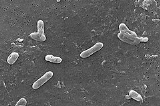
Bordetella bronchiseptica
Overview
Bordetella
Bordetella is a genus of small , Gram-negative coccobacilli of the phylum proteobacteria. Bordetella species, with the exception of B. petrii, are obligate aerobes as well as highly fastidious, or difficult to culture. Three species are human pathogens ; one of these Bordetella is a genus of small...
. It can cause infectious bronchitis
Bronchitis
Acute bronchitis is an inflammation of the large bronchi in the lungs that is usually caused by viruses or bacteria and may last several days or weeks. Characteristic symptoms include cough, sputum production, and shortness of breath and wheezing related to the obstruction of the inflamed airways...
, but rarely infects humans. Closely related to B. pertussis
Bordetella pertussis
Bordetella pertussis is a Gram-negative, aerobic coccobacillus of the genus Bordetella, and the causative agent of pertussis or whooping cough. Unlike B. bronchiseptica, B. pertussis is non-motile. Its virulence factors include pertussis toxin, filamentous hæmagglutinin, pertactin, fimbria, and...
—the obligate human pathogen
Pathogen
A pathogen gignomai "I give birth to") or infectious agent — colloquially, a germ — is a microbe or microorganism such as a virus, bacterium, prion, or fungus that causes disease in its animal or plant host...
that causes pertussis
Pertussis
Pertussis, also known as whooping cough , is a highly contagious bacterial disease caused by Bordetella pertussis. Symptoms are initially mild, and then develop into severe coughing fits, which produce the namesake high-pitched "whoop" sound in infected babies and children when they inhale air...
or whooping cough—B. bronchiseptica can persist in the environment for extended periods.
Humans are not natural carriers of B.
Discussions

